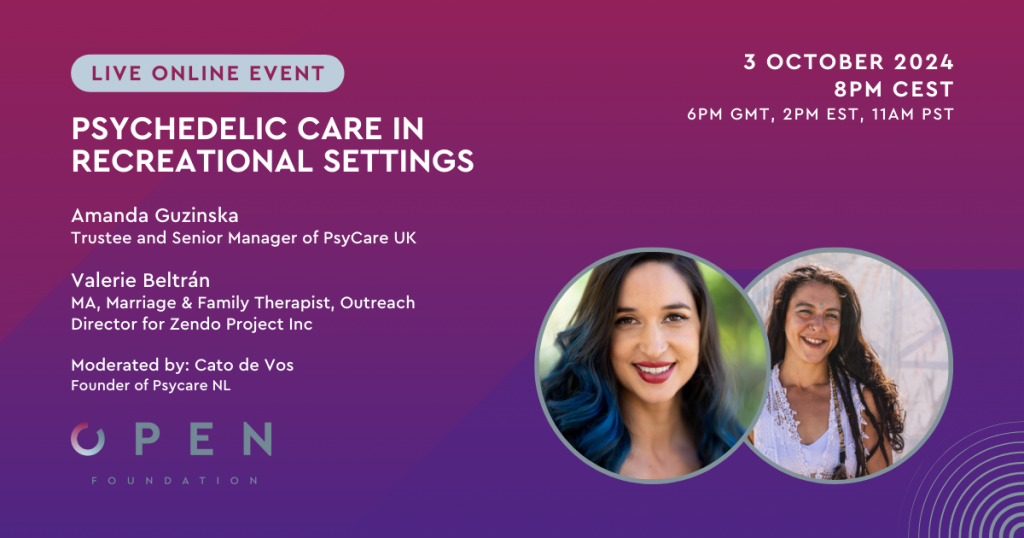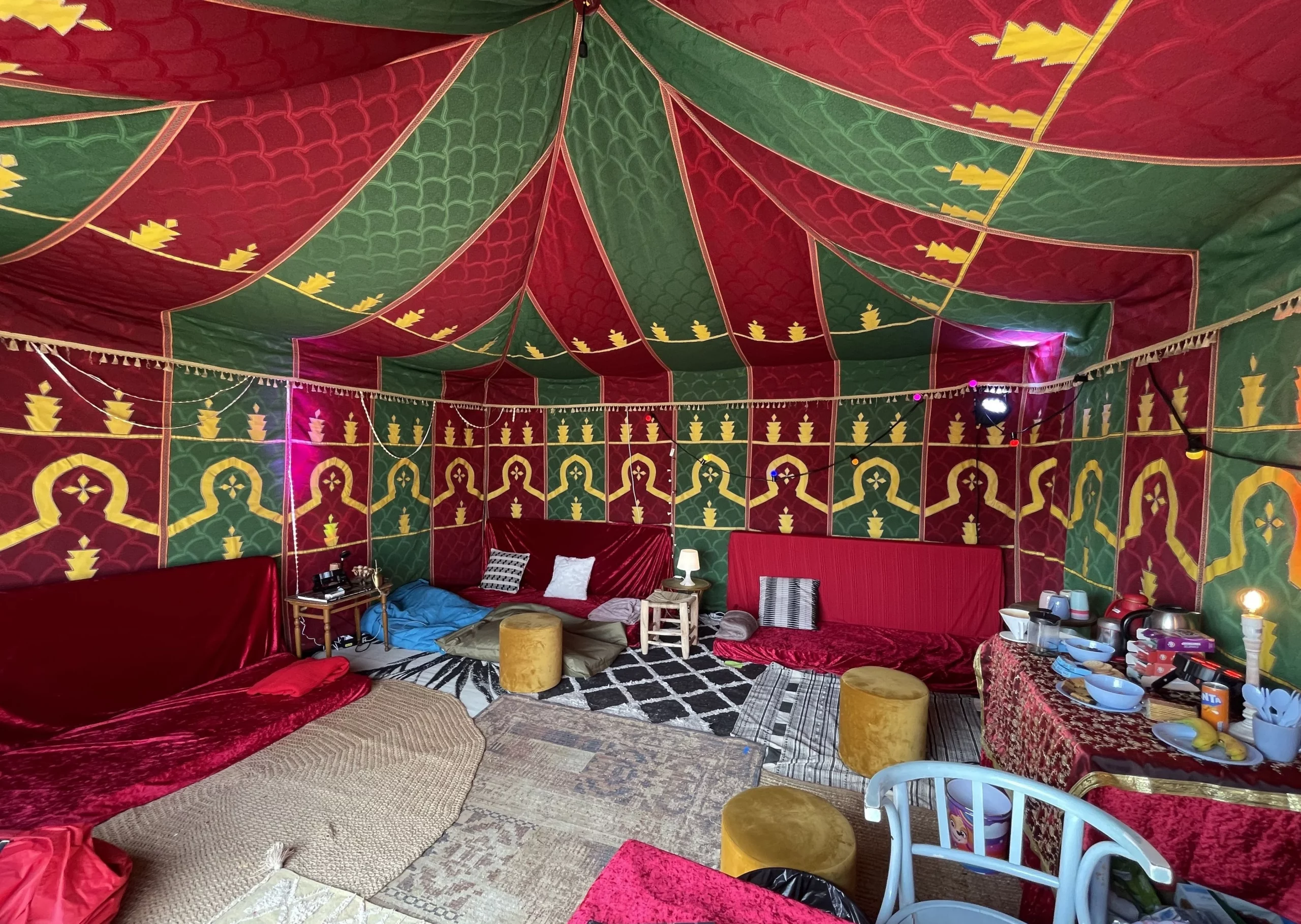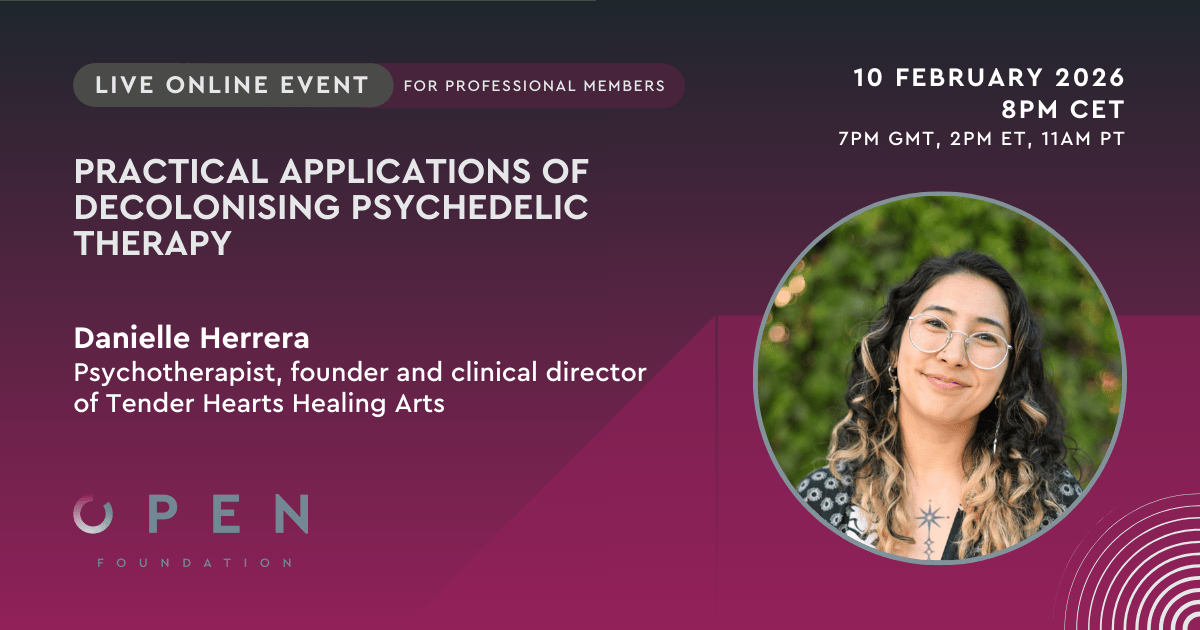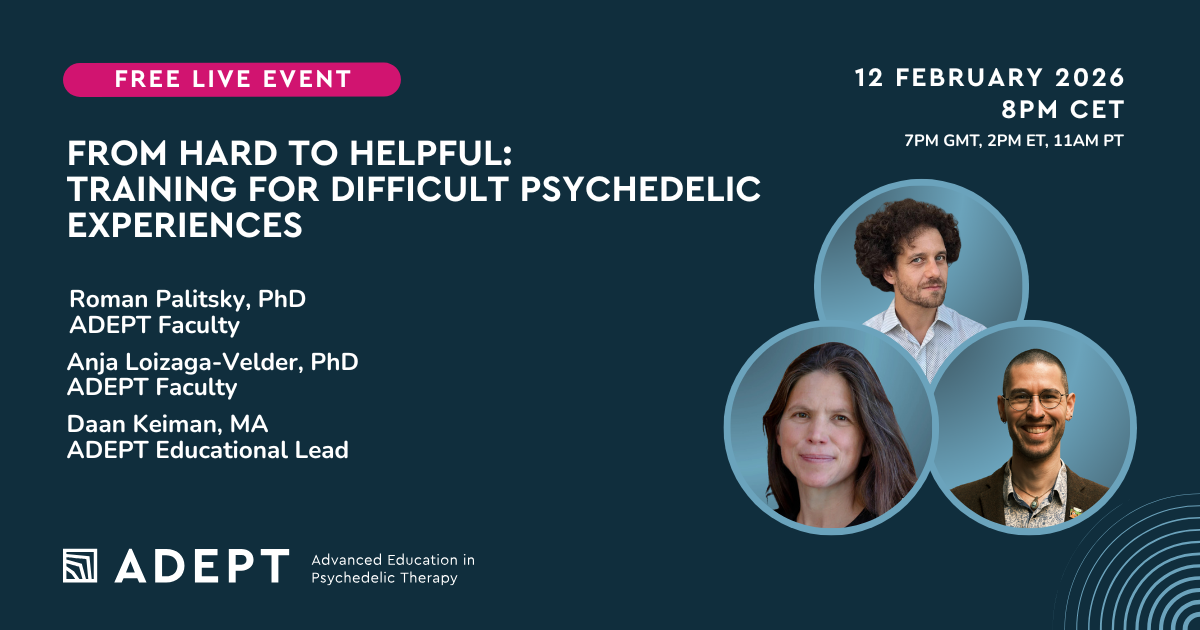From the Field: Lessons from psychedelic practices in the Netherlands is a blog series based on my qualitative research at the Rijksuniversiteit Groningen in collaboration with the OPEN Foundation. The study focused on the conception and practice of safe and beneficial use of psychedelics in group settings in the Netherlands: more specifically in counterculture, ayahuasca ceremonies and truffle retreat centers. Based on in-depth interviews with experienced practitioners, the series highlights and connects diverse aspects of psychedelic practices, from cultural influences through ethics to sensory stimuli. This article is based on my personal experience as part of a new PsyCare NL team, launched last summer (2024) at a festival in the Netherlands.
Part 1: Lessons on Psychedelic Harm Reduction with PsyCare NL – From the field (current post)
Part 2: Dutch Psychedelic Practices Shaped by Culture and Law
Part 3: From the Field: Music in Psychedelic Practices
Part 4: From the Field: Psychedelics and Nature
Part 5: From the Field: Psychedelics and Autonomy
Part 6: Safe and beneficial experiences

The Launch of PsyCare NL: Safe Psychedelic Substance Use at Festivals
The PsyCare facility is a calm, safe, cozy and grounding environment for participants in need, playing a crucial role in prevention and harm reduction at festivals where psychedelic substances are commonly used. Visitors are welcomed by experienced psychedelic peer support “sitters” with a deep understanding of mind-altering substances and a relaxed, non-judgmental approach towards difficult and challenging experiences. Ideally, a team is composed of sitters with different professional backgrounds, gender, personality and language skills to ensure the most appropriate support for all visitors.
PsyCare NL was restarted by Cato de Vos following years of volunteer work with international psychedelic support services like Kosmicare at Boom Festival. Developed with her colleague and friend Raoul Koning (who, like Cato, is part of the OPEN team), the pilot was implemented with a team of 11 members. In total, we received 41 guests over three days. Most cases were drug-related and, typical to a festival environment, involved a variety of drug types and doses, with a dominance of LSD. Other cases involved general agitation or overwhelming feelings from the festival. Some guests could not communicate their feelings or which substances they had consumed (if any). Looking back at the stats reveals strong diversity in other parameters as well, such as how guests arrived at PsyCare or for how long they stayed.
So, how can you help someone through a challenging experience with such a wide variety of cases?

Creating a Safe Haven: The Role of Psychedelic Support Services
With the exception of medical issues—which are determined by the First Aid team—we hardly followed any strict protocols. There are handy guidelines, training and even manuals for this complex and challenging work, but much of it is carried out in an intuitive manner. Like humor or the psychedelic experience itself, this sort of knowledge does not lend itself easily to words and numbers. Nevertheless, in this article, I will highlight essential aspects of PsyCare practice as they emerged from our collaboration with First Aid, feedback from guests and visitors and my own experience as a participant-observer and part of the team.
the core of psychedelic Harm Reduction: Being Present
Being present is probably the single most important element of PsyCare, and it begins with the place itself. The festival production supplied us with a Moroccan tent and a yurt, which we made cozy and aesthetic. With mattresses spread around, warm lighting and decoration, PsyCare became both a part of the festival and a peaceful haven away from it. This already had an effect, as by-passers stopped to take a look inside and ask about PsyCare. Some mentioned that they were relieved to know it’s there.
Festivals with an established PsyCare tend to offer a 24 hour per day service. In this pilot, our official opening hours were from 16:00 to 8:00, with the night hours (1:00-6:00) being the busiest. In practice, we never said ‘no’ to someone in need, and at 10:30 in the morning we welcomed our first guest. We often remind our guests that drug effects are temporary, or as the wise old saying goes: “this too shall pass”. Yet different drugs – and people – require different amounts of time. Guests’ duration of stay throughout the pilot varied from 5 minutes to 14 hours, with an average stay of 3 hours per guest.
Being present in space and time extends to the personal. Often the most meaningful thing you can do for someone who is overwhelmed is just to be there; to stay with them through this difficult moment, fully present with your attention, patience and calm, no matter what comes. Applied within the PsyCare team as well, mutual care and team spirit were vital to the success of the pilot.
Community Values: “Psychedelic Peer Support”
Festivals in this counterculture make room for spontaneity, experimentation, rule-bending and non-conformist behavior. PsyCare emerged from within this community and seems to share with it some core values that came up during my interviews, like non-judgment. In PsyCare, this is applied as refraining from value judgments of people’s experiences, behaviors, thinking processes, or beliefs. Each person’s freedom and autonomy are respected—a principle overridden only in case of imminent risk to oneself or others.
Embracing Equality and Non-Hierarchy
The principle of equality, or non-hierarchy, is another unique feature of PsyCare stemming from counterculture. As volunteers in their own community, PsyCare sitters do not operate from a position of superiority or authority in relation to visitors. They are temporarily holding space for temporary “guests”, as their name suggests. This approach carries a multitude of implications. For example, a guest can bump into their sitter from yesterday at the bar or on the dancefloor. Furthermore, yesterday’s sitter can become today’s guest. Accepting such potentialities involved conscious discussions among the team: how do we ensure guests’ privacy? Are we ‘sitters’ outside our shifts? What does this mean in practice?
On the last evening of the festival, I met a guest with whom I spent three hours in the PsyCare tent. Our guideline in such cases is to let the guest determine what happens. They smiled at me and stretched their arms for a hug. We chatted and danced together for a bit, and then they moved on. For me, this short incidental encounter on the dancefloor supplied closure and reinforced our positions as fellow festival-goers.
Such liminal cases are exactly where non-judgement and non-hierarchy shine, and have the power to turn an otherwise awkward or embarrassing situation into a meaningful, connecting and supportive event.
Awareness of Shame and Vulnerability
Coming to PsyCare requires admitting to being in need, a feeling which can be challenging for many in itself. Guests may realize that they have taken more than they can chew or even completely lost control. Exposing “weakness” is never easy, but in small communities where many people know each other, shame can become a real barrier. Considering these complexities, any authoritative position, even of ‘a professional’ or a ‘responsible adult,’ is unlikely to contribute to PsyCare as a safe haven. This is why, where other emergency services typically wear a uniform, we wore our regular (low-key) festival clothes and a name tag with a little heart on it.
Early on in the festival, I was called to check on a disoriented person and try to bring them to the PsyCare facility. Despite their highly confused condition, I managed to establish trust and we were quickly holding hands on our way to the PsyCare tent. At the same time, a First Aid worker in uniform approached us and asked if everything was alright. The guest’s state of mind changed instantly. They released their hand from mine, flinched and asked anxiously: “Did I do anything wrong?”
Following this case, we came to an agreement with the First Aid staff that they remove their jackets before entering PsyCare, notwithstanding their white uniform was chosen for its non-intimidating character. This policy was found useful by both teams.

Embracing Care: The Heart of PsyCare
Here is how Ann Shulgin described the ideal MDMA therapist back in 1995:
“[S/]he has to be able to feel something very close to love for the person [s/]he is guiding. There should be real caring and it cannot be simply an intellectual concern for the client’s welfare; it must be deeper than that, at the gut level.”
The relatively long experience with mind-altering substances in counterculture is often disregarded or looked down upon by academics, even those studying psychedelics. Some of it is pure stigma, but there is also a genuine conflict of approaches. As PsyCare sitters, we benefit from ‘subjective’ experiences at least as much as from ‘objective’ facts. Both theory and metaphor were used in our training and we followed values and approaches more than rules and protocols. Above all, PsyCare takes place in a vibrant, dynamic and sometimes chaotic setting, which is almost the opposite of a ‘controlled environment.’
The fear of intellectual uncertainty and making mistakes cannot be entirely avoided, but PsyCare consciously makes room for other ways of knowing. To describe positive attributes of an effective sitter, our training instructor Daan Keiman, who leads OPEN Foundation’s upcoming education programme in psychedelic therapy, shared the following metaphor:
If a person is immobile, shut, or stiff like a rock, we should be soft and fluid like water. If they are floating and formless like water, we would have to be their rock.
Furthermore, presence and care ought to be practiced delicately: sitters do not attempt to pull guests out of their experience but offer them a hand to grab on. Curiously, it’s the little things that have the greatest impact: a welcoming smile, a cup of tea, a blanket, holding someone’s hand, offering a hug, listening to their story, laughing with them.
In one word: Care.
An attuned caring presence can turn loneliness into a feeling of being held, and a nightmare into a meaningful experience. Like ‘love’, ‘care’ might be difficult to define or even comprehend intellectually; but luckily, this is not necessary in order to give it. Being in a festival setting, I could not help but think of it in terms of the dance floor: there are no steps, but if you listen carefully to the music and let it guide you, there will be a dance.
Continuing the Conversation on Psychedelic Support in Recreational Settings
A broader look at PsyCare will be discussed in an upcoming OPEN event (3.10.24) moderated by PsyCare NL founder Cato de Vos and featuring international Psychedelic Support Services experts Amanda Guzinska (PsyCare UK) and Valerie Beltrán (Zendo Project). Click below to register.













